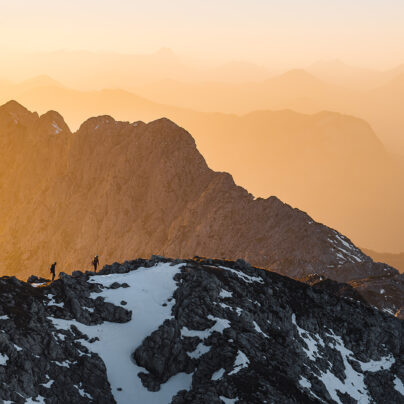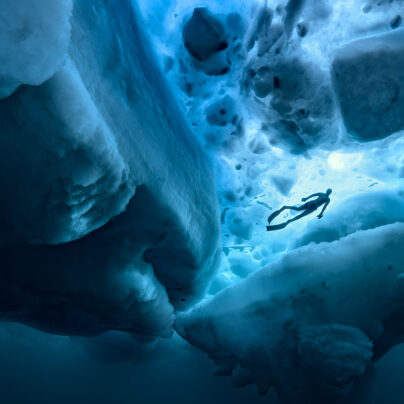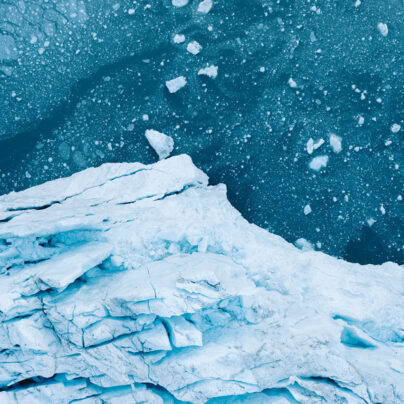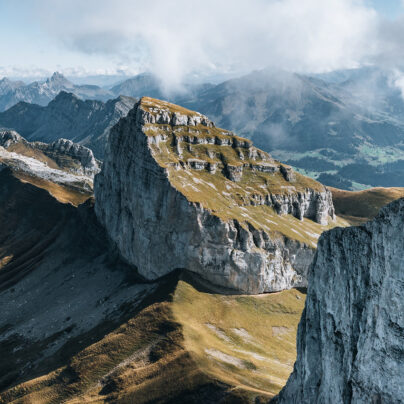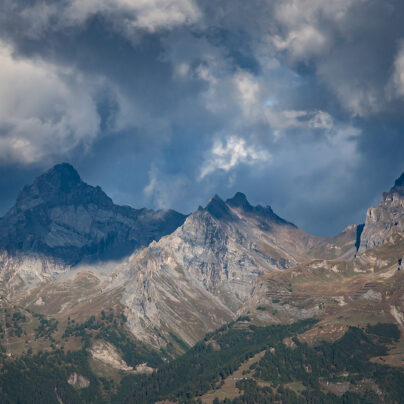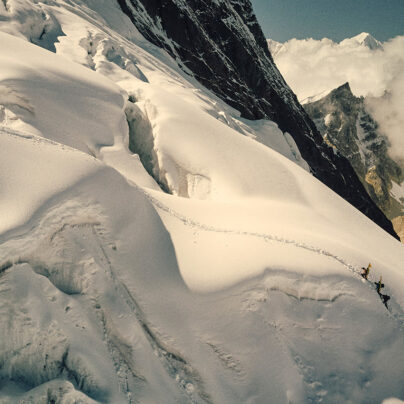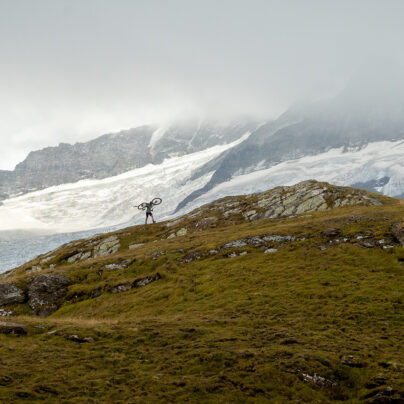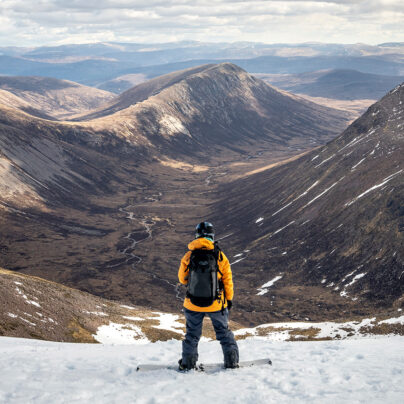A Mountain Affair
Climbing Lasarmula, Nepal
Becky Coles
The moment I’d seen a photo of the perfect, snowy, pyramidal peak, standing proud in a remote valley in the far west of Nepal, I was smitten. Most enticing of all was that the mountain appeared to be unclimbed.
She was striking, a head-turner in a crowd; totally out of our league. I’d let myself be seduced by her beauty. She’d let us think that we were the ones. Standing on the edge of the moraine I surveyed the detritus of other climbers, and our first ascent suddenly came into question. I felt betrayed.
The moment I’d seen a photo of the perfect, snowy, pyramidal peak, standing proud in a remote valley in the far west of Nepal, I was smitten. Most enticing of all was that the mountain appeared to be unclimbed. We researched the area and flirted with the idea that we’d head out to Nepal in the autumn.
***
‘It’s futile.’ Simon was thigh deep in powdery snow and we were making scant progress up the glacier, tortuously circumnavigating yawning crevasses. The blanket of soft snow had hidden most of the previous team’s mess but, occasionally, we’d spotted a strand of fixed rope crossing a crevasse. Climbing alpine style, the only rope we had was the one we carried; we left nothing behind on the mountain. We were attempting to establish a high camp below the East Ridge, but our progress was so slow that I had to admit an ascent wasn’t looking likely.
In Simikot we employed a local man with two mules to carry our equipment and supplies up the valley. After a day on the trail we left the last village behind and entered a wooded gorge. Walnut trees merged into spruce and fir, and then finally twisted birch trees with bark peeling from their trunks. A group of 20 or so men were heading to Tibet on foot, snacking on walnuts gathered from amongst the leaves and cracked open with rocks. Compared with their meagre provisions, I felt embarrassed travelling with our laden mules. The presence of such a large group of men, clutching bottles of Chinese-brewed Raksi, left me feeling conspicuous and vulnerable. However, when it came to making camp in the forest they were as tired as we were, and our night was undisturbed.
High on the mountain, temperatures had plummeted. We suffered an extremely cold night at the north col, making the best of the extra acclimatisation – it was evident that snow conditions and forecast high winds would not allow an attempt on the North Ridge. I have no idea how cold it was that night, but a couple of days later we luxuriated in our tent back at base camp, commenting on how warm it felt. We checked the thermometer. It was -8°C. The next day we watched plumes of snow rise off the summit as the wind tore across the exposed ridge.
It had taken three days to walk to the tributary valley where our peak resided. The mules plodded ahead of us. We crossed a confluence and then, quite suddenly, she appeared – even more beautiful than in the photo, and we babbled in breathless excitement at seeing the peak with our own eyes. Before now, it had only existed to us as contours on a map and a solitary photograph. It would take another day of walking to reach the base of the mountain.
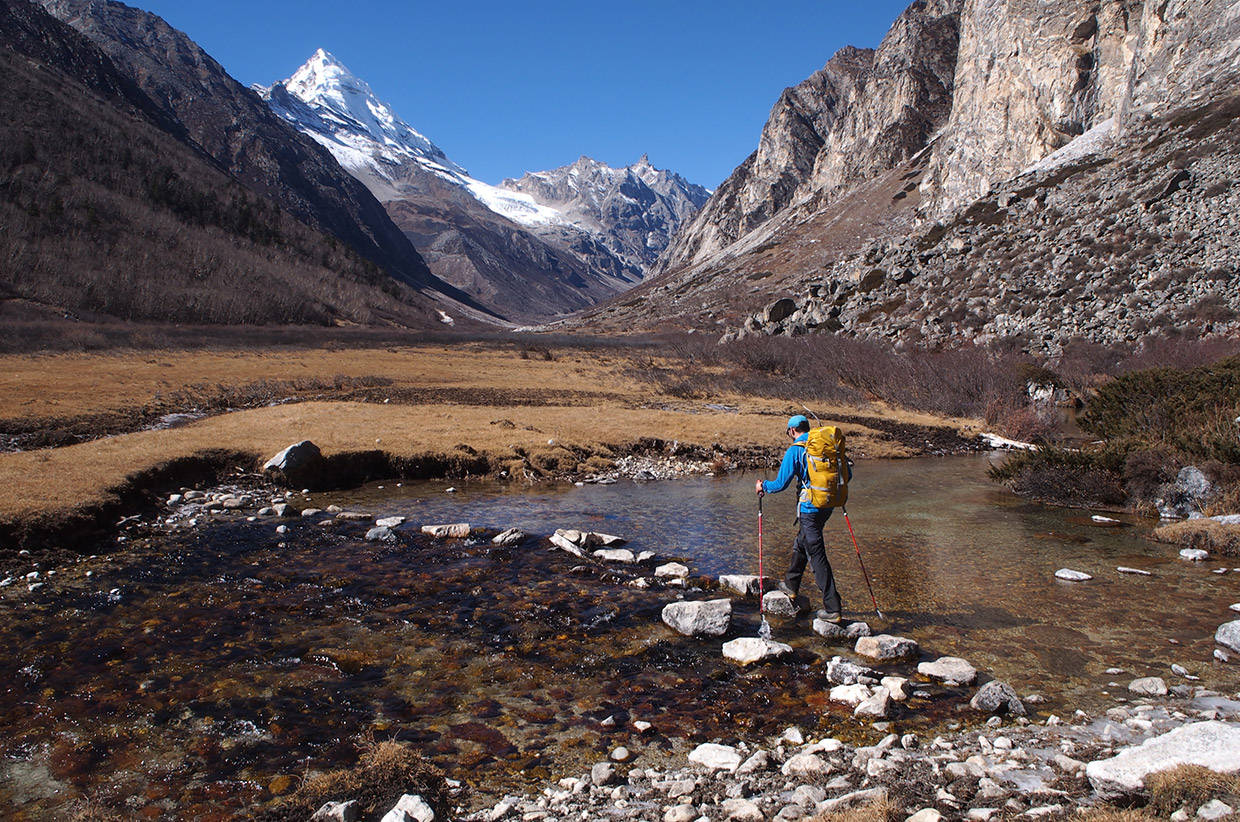
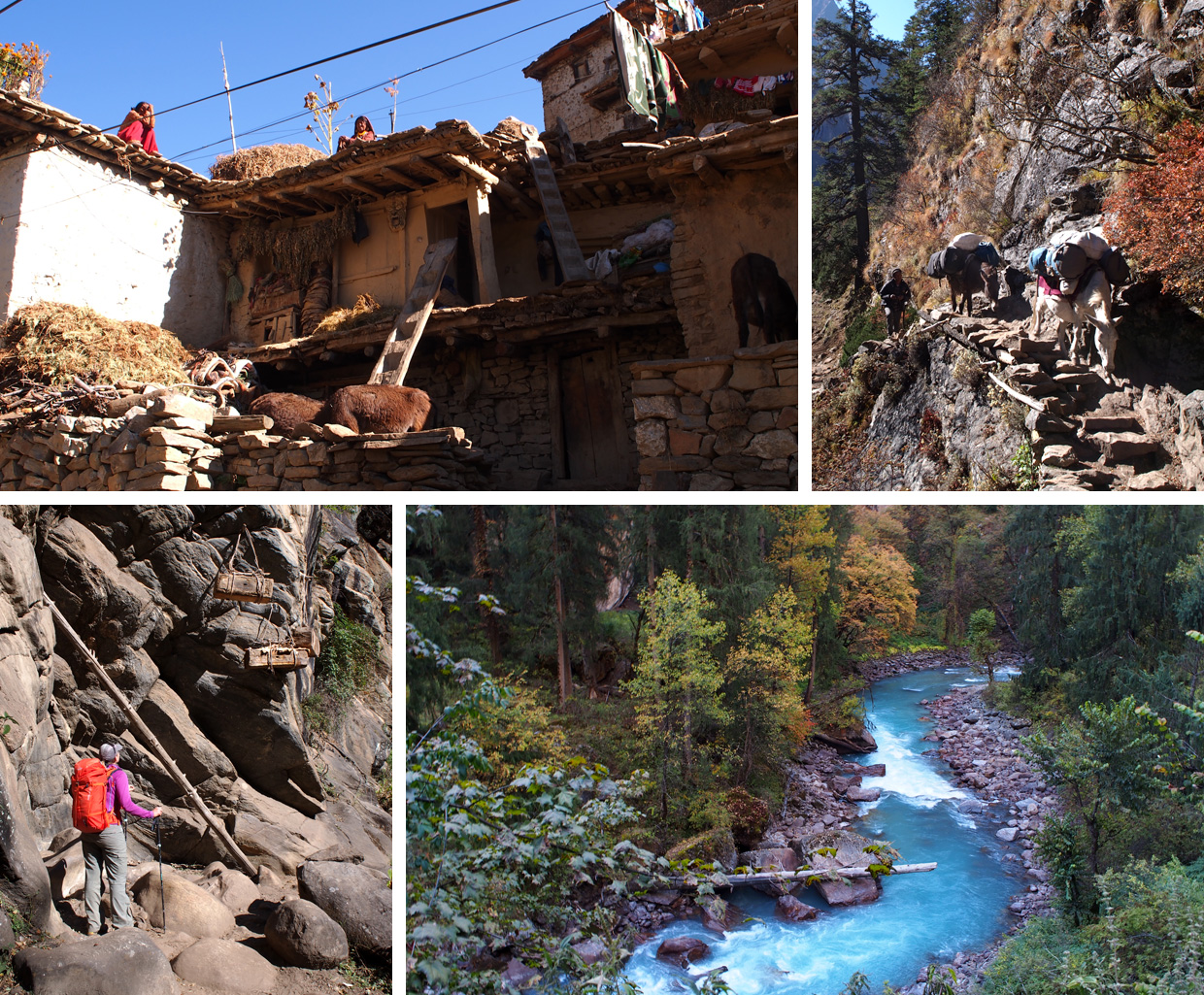
We’d reached the bergschrund. For the last hour it had seemed like we were never going to make it. The snow was so unconsolidated that the second person sank as deep as the first. But there was no time to rest; we had to get the tent up. The shadow of the mountain was creeping ever closer, and in 30 minutes the temperature would plunge. We dug, chipped and stamped a platform into the steep slope and pitched the bivy tent. Looking on the bright side, we hadn’t seen any fixed lines for several hours. Maybe the previous team hadn’t reached this high, or maybe their fixed lines were simply buried by the snow.
At the base of the mountain, where two rivers met, we came to a halt. The mules lowered their heads to graze. We unloaded them and sat in silence, watching the stove boil water for tea. Churing watched while I scribbled a note on a piece of paper. Although we had no common language to communicate, he knew how important it was that he returned. We gathered 13 rocks and counted them out to signify the days. He took the note; Rinjin, the teahouse owner in Simikot, would translate our message to him. On finishing his tea he herded the unburdened mules together and set off back down the valley. We blinked in the brightness of the day as we watched him disappear out of sight.
In the frigid hours of the morning we emerged from the bivy tent. Having not climbed as high as we’d hoped the previous day, we still had several hours of wading through soft snow on the glacier before we’d be able to gain the ridge to the summit. Route finding through the crevasses and seracs was even more difficult in the dark and the snow was worse than ever. We floundered onward.
Relief came with the greying of the night as dawn approached. The eastern horizon turned purple to orange to yellow, re-energising my body. We finally reached the ridge. The wind-scoured snow was already easier to travel across, but the climbing had only just begun, and it was already light.
In the frigid hours of the morning we emerged from the bivy tent. Having not climbed as high as we’d hoped the previous day, we still had several hours of wading through soft snow on the glacier before we’d be able to gain the ridge to the summit.

The ridge had narrowed and we looked down the South Face as the slope tumbled away out of sight. I shuddered with the thought that only my tired legs were preventing an unstoppable fall. The sun’s arc was dipping now, it was late in the day, time was running out, our chance was slipping away. She was teasing us.
The day after Churing left we planned to explore a side valley, for interest as much as acclimatisation, but I woke feeling unwell. I lazed in the sun feeling sorry for myself as Simon made endless cups of tea. Temporary shepherd huts – crude stone walls with a wooden pole for a roof apex which a tarp could be thrown over – littered the valley. The area was clearly used for grazing yaks when the grass flushed green. Now, with autumn upon us, the land was yellow and brown, tinder dry, and deserted.
A man startled us. He was alone, with only the clothes he stood in. We made him a cup of tea and tried to make conversation, but soon fell into silence. He finished his tea, washed and returned his cup and continued up the valley. We’d thought we wouldn’t meet anyone here, and now we were worried that our camp would be too tempting when we left it unattended to climb the mountain. We packed up, forded the icy river, and found a more secluded site.
With the camp relocated we continued to lounge in the sun, until we saw smoke rising. Maybe the man was setting up camp too? But within the hour the whole side of the mountain in the tributary valley was alight – the valley we’d intended to walk up that day. We’d thought that the man had been talking about yaks and grazing. He had been trying to tell us that he was burning the scrub to improve the pasture for the herds the following year. Flames licked the side of the mountain long into the night. Fate had been on our side.
‘Will you be able to get back down?’ Simon said, sensing how close to exhaustion I was. We’d been climbing for nine hours and the ridge still stretched out before us. Steepenings momentarily halted our progress as we switched to pitched climbing, but we hadn’t seen any fixed rope on the East Ridge, and I was now convinced that the previous team hadn’t got this high. I pulled an ice screw from my harness with a gloved hand and wound it into the hard ice, joining it to a natural ice thread to create a belay. Determination coursed through my veins.
I knew it wasn’t the summit, just another rise. But I wanted it to be the summit. I wanted it so much. She hadn’t betrayed us like I’d thought. She could be ours. It was afternoon now, and the sun was no longer our friend; it was softening the snow and making the going tough again. The ridge had narrowed and we looked down the South Face as the slope tumbled away out of sight. I shuddered with the thought that only my tired legs were preventing an unstoppable fall. The sun’s arc was dipping now, it was late in the day, time was running out, our chance was slipping away. She was teasing us.
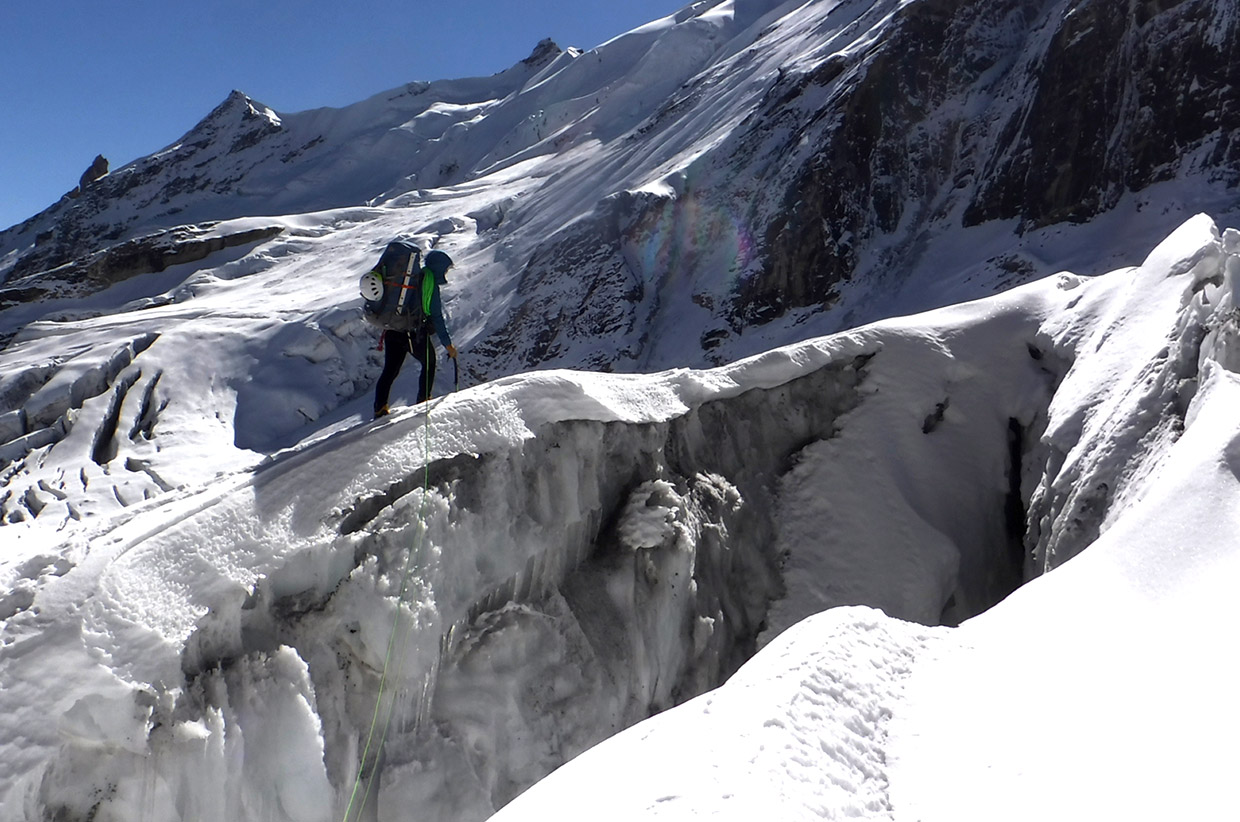
Life in base camp revolved around the sun. Although the skies were cobalt blue for the duration of our trip, sunlight was limited in the enclosed, north-facing valley. As soon as the sun hit the tent, sleeping bags were dragged out to air, clothes were washed and laid on rocks to dry, pans were cleaned, and a cooking frenzy began. In the afternoon, dark shadows crept closer to our tent. By 3.00pm the sun slipped behind the mountain and, in an instant, we were forced to swap shorts and T-shirts for down jackets, fleece trousers and thick socks. I began to worship the sun like civilisations from long ago, willing it to be upon us each morning and mourning its loss each afternoon.
On a sand bar by the river, we built a camp fire from the abundant birch wood that littered our base camp. We competed to light the fire with just one match, partly for fun, partly because we’d miscalculated the amount of matches we needed for the expedition. The flaky birch bark ignited easily. As the flames grew, warmth penetrated our bodies and our gaze switched between the playful flames and the stars jostling for attention in the inky black sky.
The river next to our base camp had been telling us it was time to leave. Ice formed along its margins each night and receded during the day, then the ice spread into the flow; eventually it bridged the water and no longer melted during the day. Our time in the valley had come to an end. One morning we saw the mules trotting towards us, followed by the grubby, smiling face of Churing.
If we didn’t summit soon we’d have to turn back empty handed. It was already an hour past our ideal summit time; a conceptual point that we’d conjured up the night before in the tent. But the weather was stable, not a breath of wind or cloud in the sky, and we could afford to descend in the dark. Then it appeared – the summit, not rearing from the ridge dramatically, simply a wind-sculpted flattening in the snow. Taking the final steps on to it I felt no elation; maybe a little relief, but mostly I felt empty. This mountain had taken everything to climb. I had little left to give her, or myself.
I looked down on the scene below me, full of mountains and valleys, and up to the sky above. There was nothing to tell us that we weren’t the only people left on Earth; no roads, settlements, or aeroplane trails across the sky. And no evidence of any other climbers before us, either. Perhaps, after all, we were the first. I gazed into the distance and a feeling of familiarity came across me as my eyes fell on a distinct peak: the holy mountain of Kailash, source of the mighty Indus and Brahmaputra rivers as well as tributaries of the Ganges, pilgrimage for Hindus and Buddhists alike. Stood on her summit, having had our initial advancements spurned, I felt privileged that she’d finally allowed us, for a few moments at least, a view on the world no one else had seen before.
Rebecca Coles is a mountaineer, expedition leader and mountaineering instructor based in the UK. She has travelled on all 7 continents and in over 70 countries, seeking mountains to climb and different cultures to experience and understand. Through her writing and talks, workshops and skills courses she inspires people to undertake their own expeditions and adventure travel.
Website: www.allbutessentialtravel.com
Twitter: @allbutessential
Instagram: @allbutessentialtravel
